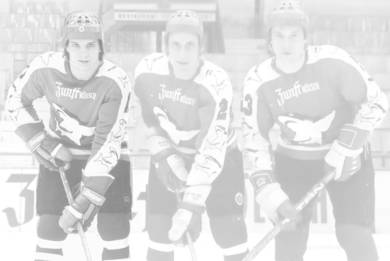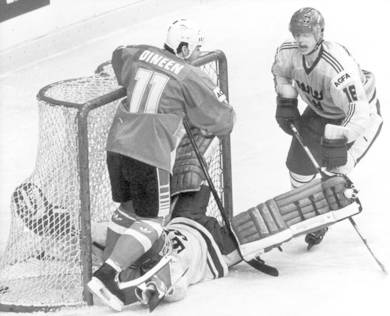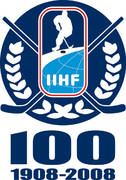Story #29
April 21 – 27, 1987 – Vienna, Austria
The mere mention of the name Miroslav Sikora is enough to make the international hockey establishment tremble. A disputed eligibility case regarding the Polish-German hockey player went so far that a district court in Vienna decided the outcome of the 1987 IIHF World Championship in the Austrian capital.
This is what happened in Vienna 21 years ago.
West Germany named the then 30-year old forward Miroslav Sikora to the team which travelled to Vienna for the 52nd IIHF World Championship. Sikora was a native Pole and when he was spelling his first name “Miroslaw” ten years earlier, he represented Poland in minor junior international competition. But when Sikora came to the World Championship, he was a naturalized German and eligible to play for his new country.
Or, so the Germans thought.
With the excellent new forward on their team, West Germany had a good start in the eight-team tournament. The team suffered “budgeted” losses to Sweden and the Soviet Union, but already in the third game, on April 20, the Germans defeated Finland 3-1. Sikora had one goal in the upset win.
At this point, events off the ice started to unfold. Finland filed a protest following the loss to the Germans. Assisted by Finnsih statistician Tom Ratschunas, Team Finland’s management produced documents which showed that Sikora had in fact represented Poland in the inaugural 1977 IIHF World U20 Championship in Czechoslovakia.
The Finns demanded that their 3-1 loss be overturned because West Germany used an ineligible player. At that time, the IIHF statutes did not -- under any circumstances -- allow a player to switch national eligibility. (The rules have been altered over the years since).
When the IIHF council sided with the Finns and revoked the two points from West Germany, the incensed Germans took the case to Landesgericht, Wien, the district court of Vienna. This started a series of protests and counter-protests which lasted a week.
During this chaotic week, the international media more or less stopped covering the championship itseld. Instead, they set up a mini-press centre at the building of the district court. Fritz Klebermass, the highest judge of the district court, became the key figure of the tournament.
Meanwhile, the hockey community did not know which was the official world championship standing--the one with West Germany getting their points from wins against Finland, and also later against Canada, 5-3 (Sikora had one goal and one assist in that game), or the one with the score reversed to 5-0 for Finland and Canada (the standard score of a forfeited game) as ruled by the IIHF.
Finally, the court and Mr. Fritz Klebermass overruled the IIHF council. One week after the original Finnish protest-and only one day before the medal round was scheduled to begin--the IIHF had to adjust the standing according to the court’s decision. The official IIHF standings carried a note: “Nach Anordnung des Landesgerichts Wien.” (“According to the ruling by the district court of Vienna.”)
The West German team was allowed to keep its points from the wins with Sikora, but the player was ruled ineligible and had to leave the tournament after his four games.
At the centre of the drama was IIHF’s former General Secretary Jan-Ake Edvinsson who had just started his new job at the IIHF, which, at that time, had its offices in Vienna.
“We must remember that this was still before the times of computers,” said Edvinsson. “Today, it’s so easy to confirm a player’s previous participation. As the IIHF office had just opened in Vienna, we simply didn’t have the game sheets from 1977. We had to rely on information from our national member associations and that was sometimes not satisfactory.”
“The Vienna district court made the correct ruling,” Edvinsson said later. “They saw the thing clearly, while the IIHF council was a little too emotional.”
So, how did the saga end as the championship moved from the district court of Vienna back to the Wiener Stadthalle, the hockey arena?
- West Germany: Despite keeping the “Sikora” points, the Germans missed the medal round by one point, finishing with six points to Canada’s seven. In the relegation round, West Germany finished second behind Finland and remained in the top pool.
- Finland: The instigator of the drama could have used the two points against West Germany had the protest gone through. Just like West Germany, the Finns finished the preliminary round with six points and out of the medal round.
- Sweden would have been the big loser had not the court interfered. The Swedes would have gone to the relegation round had Finland’s protest been successful. Instead, Sweden won their first gold medal in 25 years. (see Top Story #44).
And poor Miroslav Sikora’s career as a West German national team player was over after four games.
As part of the IIHF's 100th anniversary celebrations, www.IIHF.com is featuring the 100 top international hockey stories from the past century (1908-2008). Starting now and continuing through the 2008 IIHF World Championships in Canada, we will bring you approximately three stories a week counting down from Number 100 to Number 11.
The Final Top 10 Countdown will be one of the highlights of the IIHF's Centennial Gala Evening in Quebec City on May 17, the day prior to the Gold Medal Game of the 2008 World Championship.
These are the criteria for inclusion on this list: First, the story has to have had a considerable influence on international hockey. Second, it has to have had either a major immediate impact or a long-lasting significance on the game. Third, although it doesn't necessarily have to be about top players, the story does have to pertain to the highest level of play, notably Olympics, World Championships, and the like. The story can be about a single moment — a goal, a great save, a referee's call — or about an historic event of longer duration — a game, series, tournament, or rule change.
|
 |
Click here for the 100 Top Stories
|











